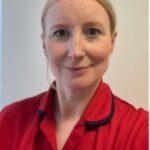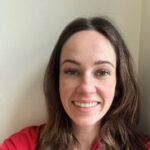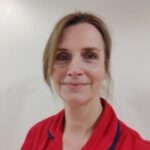Published
7 August 2025
Authors
Briony Martin and Dayna Feeney discuss how they explored an alternative approach to workforce development to overcome recruitment challenges in a specialist area.
Due to difficulties recruiting to a fixed term post, we had staffing vacancies in both our Head and Neck Cancer and Critical Care teams. Due to the complexity of the patients and support needed, both these roles are traditionally band 6 and above however we decided to trial recruiting to a band 5 post to fill the role.
Neither team had a band 5 historically, but we wanted to take a fresh approach and gauge interest from an area of the workforce we hadn’t explored before, acknowledging that this needed careful thought if successful. When we initially advertised the post, we found it difficult to locate other SLTs with band 5s/NQPs in similar posts.
At the time, Mel, a final-year student on placement across both teams, expressed a strong interest in pursuing a career in these complex areas.
Mel was successful at interview and started with us shortly after finishing her placement. Her role included the completion of post-graduate dysphagia course as is standard for NQPs in our trust, and supervisors allocated time to select non-complex patients for dysphagia training. Although this was time consuming, this was offset by her ability to support with a heavy communication caseload, delivering training and SLT representation at multidisciplinary team meetings.
Having an NQP in the team has given us a fresh perspective on complex caseloads.
Recognising the complexity of the caseloads for an NQP, we offered enhanced weekly and then monthly supervision, as well as regular band 5 peer supervision. We offered exposure to other areas such as general medicine to gain exposure to different dysphagia and communication presentations. Mel had access to her student peer group contact to ask general advice about how to complete competency evidence.
While educational for all of us, the role was not without challenges. These included the complexity of the caseload, requiring specialist training in altered airways, spinal cord injuries and head and neck surgery. At times it was difficult to find patients who were suitable to meet Mel’s developmental needs.
While the role required additional support from seniors there were many positives, including future-proofing the workforce, allowing for cross cover and upskilling a team member from early in her career – particularly around complex communication in ICU. Senior members of both teams also had the opportunity to support with NQP and dysphagia competencies which we would not typically do, and having an NQP has given us a fresh perspective on complex caseloads. Mel was able to develop specialist skills early in her career allowing for transition into a band 6 role and she has developed strong skills in balancing the dual role, recognising her own strengths and limits.
Overall, due to the rarity of the job role, we noted a lack of peer support and feel that there is more need for peer support networks for NQPs in specialist areas. Mel also benefited from experience with our acute team to build a foundation for her dysphagia skills. We have learned that the historical hierarchy of senior banding in these specialities can be challenged with the right levels of supervision and support.
Mel Willis reflects on her journey as an NQP in head and neck and critical care, sharing her experiences of personal growth, challenges, and the support she received in transitioning to complex clinical roles.
Working in head and neck and critical care as an NQP felt like a dream come true, given my passion and experience working as an assistant for some time in a range of settings. However, the pressure I put on myself to immediately be a fully competent team member was overwhelming at times. While it’s common for NQPs to feel like they’re not contributing enough, I’m learning to accept that my development is important to the team’s function.
I think as NQPs we must give ourselves the grace and time to learn, to make mistakes and to not know everything – imposter syndrome is real, but uncertainty is a good indicator that I’m not complacent!
I was incredibly fortunate to have Briony and Dayna as supervisors who put a great deal of time and effort into my development; always with patience and well-pitched advice by the bucket load, and I think I would have struggled in such complex settings without them. I’ve been able to complete my NQP and dysphagia competencies in the first year since finishing my MSc and was then successful in applying for a split head and neck/acute B6 post. As well as acute dysphagia and communication assessments, I now independently see head and neck surgery and oncology patients as part of the multidisciplinary team before, during and after treatment for assessment, therapy and advice. I’ve also started my laryngectomy competencies and am now seeing some people with laryngectomy (with supervision) which I really love as they tend to be such active participants in their own care. I enjoy all aspects of the job, and the innovative therapy approach of the service has been great for my learning. The imposter syndrome of the first few months still hangs about from time to time, but it’s getting quieter by the day!






